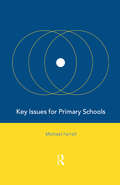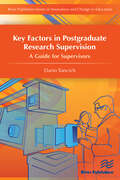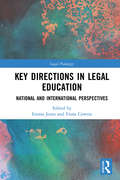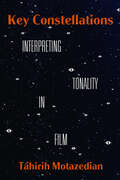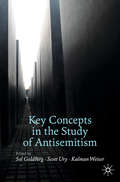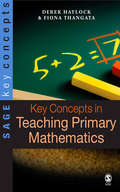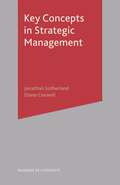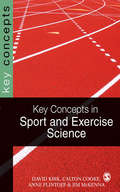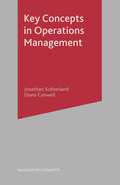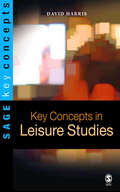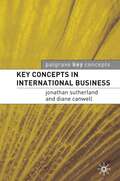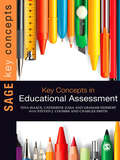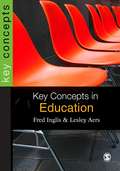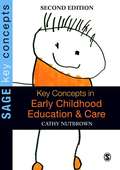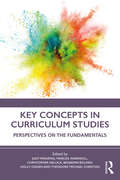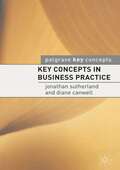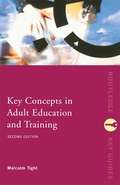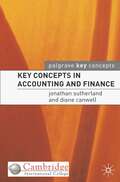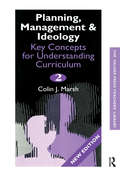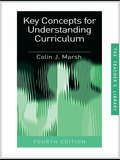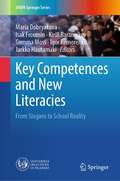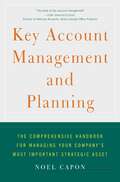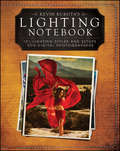- Table View
- List View
Key Issues for Primary Schools
by Michael FarrellKey Issues for Primary Schools is a concise comprehensive guide to the main issues in primary education and the implications for schools. Presented in a convenient A-Z format, the book includes coverage of:* special educational needs* attendance, truancy and exclusion* bullying and behavioural problems* management and administration* safety and security.There is also a review of up-to-date DfEE requirements and suggestions for further action and reading. The addresses of useful contacts help to make it a reference book no primary school should be without.
Key Issues for Education Researchers (Education Studies: Key Issues)
by Dr Steve Bartlett Diana M BurtonDoing a small-scale research project is a compulsory element of an Education Studies degree. This book will guide and support students through their research, offering practical advice on designing, planning and completing the research , collecting and analysing data and on writing up. It outlines the philosophical approaches underpinning research together with the key concepts and current debates in education research. Chapters cover: - Research paradigms - Ethical approaches to research - Research methods including interviewing, questionnaires, observation and experiments - Research diaries and personal biography - Writing up your research Each chapter includes points for reflection, encouraging students to explore different perceptions on the whole research project. Tasks in each chapter take readers through the process of designing and justifying their own research project. Essential reading for education studies students, it will also be very suitable for those doing masters courses in education, students on initial teacher training programmes and of interest to others, such as classroom assistants, studying education on foundation degrees .
Key Factors in Postgraduate Research Supervision A Guide for Supervisors
by Dario ToncichKey Factors in Postgraduate Research Supervision - A Guide for Supervisors is designed to inform and support university academics and researchers who are taking on the responsibilities of postgraduate research student supervision. It is aimed at early career professionals, who may be undertaking supervision for the first time, and also experienced supervisors seeking to develop a more formal framework for their supervision, in an increasingly complex academic environment. The objective of the book is to help supervisors create the complete postgraduate student. That is, an individual who can develop the rigors and disciplines of research conduct and research writing, as well as a broader understanding of the environment in which many postgraduate qualified professionals will work. The majority of postgraduate research students in the modern world ultimately use their acquired skills to work outside the university research environment, so emphasis is given to preparing research students for these varied roles, which can include management; commercial research or start-up company pathways. Any competent academic can be a good research supervisor when things are going well. Real supervisory skills only come into play when things have gone awry. That is when a professional and structured approach to problem solving and conflict resolution is required. This book seeks to provide the framework in which supervisors can develop such an approach. The topics covered in this text cover the spectrum of the supervisory process, from understanding the university research environment, through to recruiting students; induction; planning of the research program; peer review and thesis/dissertation preparation. Additionally, important peripheral issues, such as preparing graduates for various future roles; managing collaborative research programs; managing cases of misfeasance, and developing long-term relationships with students are also covered.
Key Directions in Legal Education: National and International Perspectives (Legal Pedagogy)
by Emma Jones Fiona CownieKey Directions in Legal Education identifies and explores key contemporary and emerging themes that are significant and heavily debated within legal education from both UK and international perspectives. It provides a rich comparative dialogue and insights into the current and future directions of legal education. The book discusses in detail topics like the pressures on law schools exerted by external stakeholders, the fostering of interdisciplinary approaches and collaboration within legal education and the evolution of discourses around teaching and learning legal skills. It elaborates on the continuing development of clinical legal education as a component of the law degree and the emergence and use of innovative technologies within law teaching. The approach of pairing UK and international authors to obtain comparative insights and analysis on a range of key themes is original and provides both a genuine comparative dialogue and a clear international focus. This book will be of great interest for researchers, academics and post-graduate students in the field of law and legal pedagogy.
Key Constellations: Interpreting Tonality in Film (California Studies in Music, Sound, and Media #4)
by Táhirih MotazedianKey is one of the simplest building blocks of music and is among the foundational properties of a work’s musical identity—so why isn’t it a standard parameter in discussing film music? Key Constellations: Interpreting Tonality in Film is the first book to investigate film soundtracks—including original scoring, preexisting music, and sound effects—through the lens of large-scale tonality. Exploring compelling analytical examples from numerous popular films, Táhirih Motazedian shows how key and pitch analysis of film music can reveal hidden layers of narrative meaning, giving readers exciting new ways to engage with their favorite films and soundtracks.
Key Concepts in the Study of Antisemitism (Palgrave Critical Studies of Antisemitism and Racism)
by Scott Ury Kalman Weiser Sol GoldbergThis volume is designed to assist university faculty and students studying and teaching about antisemitism, racism, and other forms of prejudice. In contrast with similar volumes, it is organized around specific concepts instead of chronology or geography. It promotes conversation about antisemitism across disciplinary, geographic, and thematic lines rather than privileging a single methodological paradigm, a specific academic field, or an overarching narrative. Its twenty-one chapters by leading scholars in diverse fields address the relationship to antisemitism of concepts ranging from Anti-Judaism to Zionism. Each chapter not only traces the history and major scholarly debates around a key concept; it also presents an original argument, points to avenues for further research, and exemplifies a method of investigation.
Key Concepts in Teaching Primary Mathematics (SAGE Key Concepts series)
by Derek HaylockCovering the key principles and concepts in the teaching and learning of mathematics in primary schools, this text provides trainee and practising teachers with a quick and easy reference to what they need to know for their course, and in the classroom. The entries are arranged alphabetically, and each contains a brief definition, followed by an explanation and discussion, practical examples and annotated suggestions for further reading. Examples of the wide-ranging material include: Anxiety about mathematics; Assessment for Learning; Cognitive conflict; Concept learning; Creativity in mathematics; Differentiation; Equivalence; Explanation; Investigation; Low attainment; Making connections; Meaningful context; Mental calculation; Numeracy; Play as a context for learning mathematics; Problem-solving; Questioning; Talk.
Key Concepts in Strategic Management (Key Concepts)
by Jonathan SutherlandKey Concepts in Strategic Management is one of a range of comprehensive glossaries with entries arranged alphabetically for easy reference. All major concepts, terms, theories and theorists are incorporated and cross-referenced. Additional reading and Internet research opportunities are identified. More complex terminology is made clearer with numerous diagrams and illustrations. With over 500 key terms defined, the book represents a comprehensive must-have reference for anyone studying a business-related course or those simply wishing to understand what strategic management is all about. It will be especially useful as a revision aid.
Key Concepts in Sport and Exercise Sciences (SAGE Key Concepts series)
by David Kirk Jim Mckenna Anne Flintoff Carlton B. Cooke'A very useful introduction to the key concepts in five main areas of study in sport and exercise science. The multi-disciplinary nature of the book is particularly attractive as it means that it can be used to support students studying a range of sport and exercise courses and modules. Furthermore, the chapters are concise, informative, written in an accessible style, and provide a good balance between theory and application to practice, making it a very interesting and relevant read' - Dr Lorraine Cale, Loughborough University This book provides students and scholars with a fail-safe guide to the key concepts in the field of Sport & Exercise Science. Intelligently cross-referenced entries provide a sound map of the multi-disciplinary demands of sport related courses including physical and biological sciences, social science and education. The entries use clear definitions, examples and suggestions for further reading to explore each discipline and are: " Comprehensive " Lucid " Pertinent to study needs " Practically relevant David Kirk is Professor in Physical Education and Youth Sport Carlton Cooke is Professor in Physical Education Anne Flintoff is Reader in Physical Education Jim McKenna is Professor in Physical Activity and Health All at the Carnegie Faculty of Sport and Education, Leeds Metropolitan University.
Key Concepts in Operations Management (Key Concepts)
by Jonathan SutherlandKey Concepts in Operations Management is one of a range of comprehensive glossaries with entries arranged alphabetically for easy reference. All major concepts, terms, theories and theorists are incorporated and cross-referenced. Additional reading and Internet research opportunities are identified. More complex terminology is made clearer with numerous diagrams and illustrations. With almost 600 key terms defined, the book represents a comprehensive must-have reference for anyone studying a business-related course or those simply wishing to understand what operations management is all about. It will be especially useful as a revision aid.
Key Concepts in Leisure Studies (SAGE Key Concepts series)
by David E Harris`This book confirms David Harris' status as a leading theorist in contemporary culture and leisure in the UK. He offers a distinctive, coherent and authoritative guide to the major concepts and debates that should engage leisure scholars and scholarship' - Dr Peter Bramham, Senior Lecturer in Leisure Studies, Leeds Metropolitan University Written with the needs of today's student in mind, the SAGE Key Concepts series provides accessible, authoritative and reliable coverage of the essential issues in a range of disciplines. Written in each case by experienced and respected experts in the subject area, the books are indispensable study aids and guides to comprehension. Cross-referenced throughout, the format encourages understanding without sacrificing the level of detail and critical evaluation essential to convey the complexity of the issues. Key Concepts in Leisure Studies: * Provides a student-friendly guide to the key debates in leisure studies * Reflects recent developments in the field, encompassing related work in media studies, cultural studies, sports studies and sociology * Cross-references each 1500 word exposition to other concepts in the field * Offers definitions, section outlines and further reading guidance for independent learning * Is supported by the author's website http:/www.arasite.org/keyconc.html * Is essential reading for undergraduates and NVQ students in leisure studies.
Key Concepts in Learning Disabilities (SAGE Key Concepts series)
by Tom Mason Geoff Astbury Pat Talbot"A helpful resource for those undertaking studies in learning disabilities at all levels. I shall definitely be recommending it to my students!" - John Boarder, Bangor University "This book provides a valuable and innovative contribution to the field of Learning Disabilities." - Logan Parumal, University of Manchester Key Concepts in Learning Disabilities is a handy guide to the topics you need to know about whether studying or working in the field of Learning Disabilities. The A-Z format allows you to "dip in" and quickly find relevant information on topics ranging from Autism to Rights and from Advocacy to Challenging Behaviours. Each entry features: - a snapshot definition of the concept; - a broader discussion of the main issues and applications to practice; - key points; - a case study, and - signposts to further reading. Key Concepts in Learning Disabilities is an ideal companion to study and particularly useful for those completing academic assignments as part of training. Written by a team of experienced practitioners and lecturers, the book reflects the multi-disciplinary nature of contemporary practice.
Key Concepts in International Business (Key Concepts)
by Jonathan SutherlandKey Concepts in International Business is one of a range of comprehensive glossaries with entries arranged alphabetically for easy reference. All major concepts, terms, theories and theorists are incorporated and cross-referenced. Additional reading and Internet research opportunities are identified. More complex terminology is made clearer with numerous diagrams and illustrations. With over 500 key terms defined, the book represents a comprehensive must-have reference for anyone studying a business-related course or those simply wishing to understand what international business is all about. It will be especially useful as a revision aid.
Key Concepts in Educational Assessment (SAGE Key Concepts series)
by Charles Smith Graham Herbert Catherine Zara Tina Isaacs Steven J. CoombsKey Concepts in Educational Assessment provides expert definitions and interpretations of common terms within the policy and practice of educational assessment. Concepts such as validity, assessment for learning, measurement, comparability and differentiation are discussed, and there is broad coverage of UK and international terminology. Drawing on the considerable expertise of the authors, the entries provide: - clear definitions - accounts of the key issues - authoritative and reliable information - suggestions for further reading Created to support students of education on undergraduate and postgraduate courses, and established education professionals including those who are members of the Chartered Institute of Educational Assessors (CIEA), this book is an accessible guide for anyone engaged in educational assessment. Tina Isaacs is Director of the MA in Educational Assessment at the Institute of Education, London. Catherine Zara was most recently Director of the MA in Educational Assessment and Director of the BA (Hons) in Post Compulsory Education and Training at the University of Warwick. Graham Herbert was most recently Director of the CIEA. Steve J. Coombs is Head of Department for Continuing Professional Development at Bath Spa University, which offers an MA in Educational Assessment. Charles Smith is senior lecturer in economics and education at Swansea Metropolitan University of Wales Trinity Saint David.
Key Concepts in Education (SAGE Key Concepts series)
by Fred Inglis Lesley Aers[The SAGE Key Concepts series provides students with accessible and authoritative knowledge of the essential topics in a variety of disciplines. Cross-referenced throughout, the format encourages critical evaluation through understanding. Written by experienced and respected academics, the books are indispensable study aids and guides to comprehension. ] 'Dipping into this short collection reveals an eminently useful resource aimed at providing not just a use-friendly lexicon but also an example of a degree of criticality for those new to the area of education…. the authors manage to tackle some serious issues with conviction, clarity and concision, all the while maintaining a sense of humour where comparable examples merely seem pedantic' - ESCalate 'This is an essential resource for anyone serious about using the English Language to talk about teaching and learning. . . . Inglis and Aers provide a resource for [a common professional language] in their compact and highly accessible book. It has a sound philosophical rationale in which 102 key concepts in education are presented alphabetically and cross-referenced (the book reads like a high quality hyperlinked web-page)' - www. thinkingclassroom. co. uk 'This is an engaging and accessible resource which explains various sociological, philosophical and psychological concepts relevant to contemporary educational practice. The concepts are succinctly and sometimes provocatively defined and related to today's pressing issues. It will be a particularly useful reference tool for students and practitioners of education alike, with each entry including references for further reading' - Geoff Whitty, Director, Institute of Education, University of London 'If you are seeking a clear guide to principles which should guide public life in general and education in particular, look no further. Inglis and Aers write with enviable and compelling clarity. Something for all in education especially practitioners and policy makers to read and return to' - Tim Brighouse, recently Chief Adviser for London Schools and formerly Chief Education Officer for Birmingham This text provides students with over 100 essential themes, topics and expressions that Education students are likely to encounter, both during their courses and beyond in professional practice. Co-authored to draw on experiences of working within academia, local authorities and the classroom, the entries provide: - a definition of the concept - a description of the historical and practical context - an explanation of how the concept is applied - an evaluation of the concept - helpful references and suggested further reading This book will be essential reading for students of Education, and an invaluable reference tool for their professional careers. Fred Inglis is Emeritus Professor of Cultural Studies, University of Sheffield. Lesley Aers is a senior member of a local authority school improvement service and an Ofsted inspector. Both authors are former schoolteachers.
Key Concepts in Early Childhood Education and Care (SAGE Key Concepts series)
by Cathy Nutbrown'In this ever changing field, I would recommend this book as a valuable resource. As the author states, it certainly does point you in the right direction - a beginning' - Early Years 'This is a handy reference guide for all early years practitioners, but students and trainees in particular will value this comprehensive, but accessible guide to the terms in current use in the field of early education and childcare. It is easy to read and to find the information you are after' - Early Years Update 'In the rapidly changing field of Early Childhood Education and Care, Cathy Nutbrown has attempted a most difficult task - that of identifying the important topics that are relevant and interesting to practitioners working with young children. And how she has succeeded! This is a text that is comprehensive in its scope and written in a highly accessible style. It provides an informed and stimulating insight into the key concepts and issues in early years that will captivate readers. The book illuminates these concepts by combining current research, case studies and practical examples with helpful further reading. Like a chocolate box, I found it difficult to know which to choose first!' - Jonathan Doherty, Head of Early Childhood Education, Leeds Metropolitan University Cathy Nutbrown, a leading academic in early childhood education, identifies and explains key terms and practices central to the work and study of early childhood in this accessible reference text. A must for practitioners working with children from birth to the end of the foundation stage, and for students following courses in early childhood education and care, it details key issues, identified in a survey of over 300 practitioners in the field, and provides reading and reference sources to assist practitioners and students in identifying further material to support their work. The book includes: o Origins and definitions o Research issues o Examples from practice o References and indicative further reading o Links o Key words Highly readable, with clear indexing and cross referencing, this is an ideal book to turn to as a starting point for learning more about national and international issues in early childhood education and care.
Key Concepts in Curriculum Studies: Perspectives on the Fundamentals
by Judy Wearing Marcea Ingersoll Christopher DeLuca Benjamin Bolden Holly Ogden Theodore Michael ChristouOffering an accessible entry into curriculum theory, this book defines and contextualizes key concepts for novice and experienced students. Leading scholars in curriculum studies provide short anchor texts that introduce, define, and situate contemporary curriculum theory constructs. Each anchor text is followed by two concise, creative keyword responses that demonstrate varied perspectives and connections, allowing readers to reflect on and engage with the personal relevance of these fundamental concepts. Useful to instructors and scholars alike, this book explains keyword writing as a teaching and learning strategy and invites readers to enter the complicated conversations of contemporary curriculum theory through their own creative, personal responses. Featuring wide-ranging, nuanced, and varied commentary on major relevant themes, as well as discussion questions for students, this book is an essential text for doctoral and masters-level courses in curriculum studies.
Key Concepts in Business Practice (Key Concepts)
by Jonathan SutherlandKey Concepts in Business Practice is one of a range of comprehensive glossaries with entries arranged alphabetically for easy reference. All major concepts, terms, theories and theorists are incorporated and cross-referenced. Additional reading and Internet research opportunities are identified. More complex terminology is made clearer with numerous diagrams and illustrations. With over 500 key terms defined, the book represents a comprehensive must-have reference for anyone studying a business-related course or those simply wishing to understand what business practice is all about. It will be especially useful as a revision aid.
Key Concepts in Adult Education and Training
by Malcolm TightAs adults, we are all continually involved in learning, with increasing numbers of us engaged in more formalized forms of learning; that is, in education or training. All those involved in the broad field of adult education and training will come into contact with many specialist ideas or concepts. It is often assumed of students that they already have a general understanding of these concepts, their meanings, applicability and inter-relationships. This is not always the case.This book examines in detail over forty of these key concepts, ranging from community education and experiential learning to competence and access. It presents a clear, analytical discussion in jargon-free language. It is, therefore, indispensable to all students and practitioners of adult education and training.
Key Concepts in Accounting and Finance (Key Concepts)
by Jonathan SutherlandKey Concepts in Accounting and Finance is one of a range of comprehensive glossaries with entries arranged alphabetically for easy reference. All major concepts, terms, theories and theorists are incorporated and cross-referenced. Additional reading and Internet research opportunities are identified. More complex terminology is made clearer with numerous diagrams and illustrations. With almost 600 key terms defined, the book represents a comprehensive must-have reference for anyone studying a business-related course or those simply wishing to understand what accounting and finance is all about. It will be especially useful as a revision aid.
Key Concepts for Understanding the Curriculum
by Colin J. MarshEach chapter of this book is devoted to a separate concept, which is analyzed in terms of its major features. Follow-up questions at the end of each chapter are designed to challenge the reader to reflect further on the specific issues raised.
Key Concepts for Understanding Curriculum: Key Concepts For Understanding The Curriculum (Teachers' Library)
by Colin J MarshKey Concepts for Understanding Curriculum is an invaluable guide for all involved in curriculum matters. Now fully updated, this revised and enlarged fourth edition provides not only a solid grounding in the subject but also covers the latest trends and issues affecting the field. Written in Marsh's clear and accessible style, the book details the strengths, weaknesses and controversies around major concepts in curriculum, including curriculum planning and development curriculum management teaching perspectives collaborative involvement in curriculum curriculum ideology. Now updated with new chapters on curriculum models, school-based curriculum development, learning studies, ICT developments in assessment, the new edition includes extra detail on standards and essential learning factors that have recently been introduced in a number of countries, including the UK, USA and Australia. This up-to-date edition of a definitive text will be essential reading for anyone involved in curriculum planning or development. It will be especially useful to students training to be teachers, and practising teachers following professional development programmes.
Key Competences and New Literacies: From Slogans to School Reality (UNIPA Springer Series)
by Maria Dobryakova Isak Froumin Kirill Barannikov Gemma Moss Igor Remorenko Jarkko HautamäkiThis edited book is a unique comprehensive discussion of 21st century skills in education in a comparative perspective. It presents investigation on how eight very different countries (China, Canada, England, Finland, Poland, South Korea, the USA and Russia) have attempted to integrate key competences and new literacies into their curricula and balance them with the acquisition of disciplinary knowledge. Bringing together psychological, sociological, pedagogical approaches, the book also explores theoretical underpinnings of 21st century skills and offers a scalable solution to align multiple competency and literacy frameworks. The book provides a conceptual framework for curriculum reform and transformation of school practice designed to ensure that every school graduate thrives in our technologically and culturally changing world. By providing eight empirical portraits of competence-driven curriculum reform, this book is great resource to educational researchers and policy makers.
Key Account Management and Planning: The Comprehensive Handbook for Managing Your Company's Most Important Strategic Asset
by Noel CaponThe vastly increased level of competitive intensity faced by corporations and the increased costs of selling have radically changed the nature of the traditional selling process. Key or "strategic" accounts have now become a company's most important asset, in some cases supplying in excess of 80 percent of a firm's revenues. Here, in one powerful volume, key account management expert Noel Capon provides the most comprehensive treatment of key account management and planning yet published. For the first time, Capon introduces his breakthrough four-part "congruence model" of key account management -- a new, thoroughly researched approach to optimally managing your key account portfolio. First, the author shows how to select and conceptualize the key account portfolio; second, how to organize and manage key accounts; third, how to recruit, select, train, retain, and reward key account managers; and fourth, how to formulate and execute strategy and issues of coordination and control. This congruence model serves as a backdrop as Capon takes the reader step-by-step through the vital functions of key account management including identifying key account criteria, considering the threats and opportunities for the key account, and understanding the roles and responsibilities of critical players. Capon backs up his points with extensive research, real-life stories of successes and failures at a variety of companies, and clarifying figures. Special chapters are devoted to partnering with key accounts and in-depth information on global key account management, an increasingly important weapon for staying ahead of the competition. Timely, important, and essential, Key Account Management and Planning is the only reference handbook those with key account responsibilities will ever need.
Kevin Kubotas Lighting Notebook
by Kevin KubotaGet professional advice from one of the world's top wedding photographersCreative use of lighting is a hallmark of quality photography. Kevin Kubota has been listed among the world's top 10 wedding photographers by American Photo magazine and named a Legend Behind the Lens by Nikon. This guide features dozens of his unique lighting and post-production recipes and techniques, each illustrated with a spectacular image.Author Kevin Kubota enjoys a cult-like following among professional photographers and has earned numerous accolades for his talentIncludes the author's unique lighting and post-production recipes and techniques that reinforce the theory that good lighting is the key to quality photographyPresents a number of shooting scenarios with behind-the-scenes setup, a description of the photographer's objective, the equipment used, and the resulting image for eachFeatures a companion app that will enable the photographer to search and find lighting suggestions by subject, style, budget, equipment, and other guidelines, all while in the fieldKevin Kubota's Lighting Notebook for Digital Photographers is almost like having the famous photographer sharing his secrets with you one on one.
